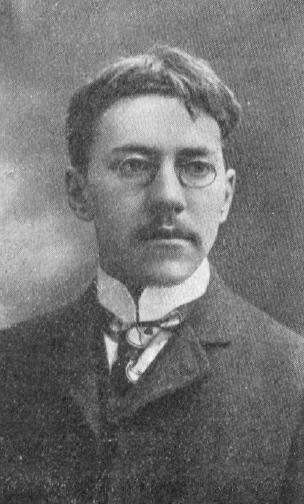
Edward Winter

Rudolf Swiderski
An exceptional game in which both players make queen sacrifices:
Rudolf Swiderski – Horatio Caro
Barmen, 18 August 1905
English Opening
1 c4 e5 2 Nc3 Nf6 3 g3 Bc5 4 Bg2 O-O 5 e3 Nc6 6 Nge2 Re8 7 O-O e4 8 Qc2! Qe7! 9 Nf4 Nb4 10 Qb1 c6 11 a3 Na6 12 d4 exd3 13 Qxd3 d6 14 b4 Bb6 15 Bb2 Ng4 16 Ne4 Ne5 17 Qc3 f6 18 Rad1 Bc7 19 h3 Bf5 20 g4? Nxg4 21 Ng3 Nh6 22 Kh1 Rad8 23 Rg1 Bg6 24 Nxg6 hxg6 25 Be4 Qe6 26 Rg2 Qxh3+ 27 Rh2 Qg4 28 f3 Qxg3 29 Rg1 Qxh2+!! 30 Kxh2 d5+ 31 f4 Rxe4 32 cxd5 Kh7! 33 dxc6 Nf5 34 Bc1 Rde8 35 b5 Nxe3 36 Rh1 Bxf4+ 37 Kg1+ Bh6 38 bxa6 Rg4+ 39 Kf2! Rf4+ 40 Kg3 Nf5+ 41 Kg2 Re2+ 42 Kg1 Rg4+ 43 Kf1 Ng3+??
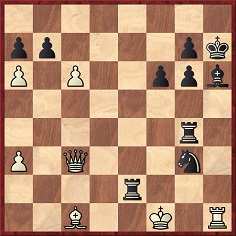
44 Qxg3!! Rxg3 45 axb7!! Rgg2 46 Rxh6+! gxh6 47 b8(Q) Rgf2+ 48 Kg1 Rf5 49 Qxa7+ Kg8 50 Bxh6 Re1+ 51 Kg2 Re2+ 52 Kg3 Resigns. (Punctuation follows the tournament book.)
Little seems to be known about Swiderski. In his autobiography (pages 11-12) Marshall (Reinfeld?) writes: ‘Swiderski, en passant, was a peculiar fellow. He made very few friends, had a gentle but melancholy disposition, was a fine violinist, ate raw meat, committed suicide a few years later.’ In Lasker & His Contemporaries number three, page 116, there is another Marshall quote: ‘Of all the chess masters I ever met, R. Swiderski of Germany was the most weird.’
(751)
We seek more information from press reports about the suicide of Rudolf Swiderski, at the age of 31, in Leipzig in August 1909.
The final game of Swiderski’s life (a draw against G. Enderlein in a tournament in Leipzig on 30 July 1909) was published on pages 301-302 of Deutsches Wochenschach, 29 August 1909. A curiosity reported by the same magazine (14 November 1909 issue, page 402) is that because Swiderski died before the event (a club tournament) finished, he was not regarded as the first prize winner, despite having the highest score.
(2776)
A group photograph featuring Swiderski (standing third from the left) at Coburg, 1904:
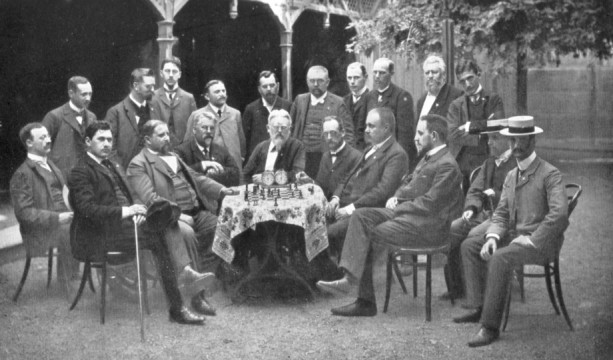
Standing (left to right): C.
Schlechter, H. Ranneforth, R. Swiderski, C. Schröder, A. Schott,
F. Tausch, W. John, H. Süchting, C. Teller, L. Fleischmann.
Seated: J. Mieses, H. Wolf, H. von Gottschall, P. Schellenberg,
R. Gebhardt, J. Berger, G. Marco, O. Bernstein, C. von
Bardeleben, H. Caro.
(3570)
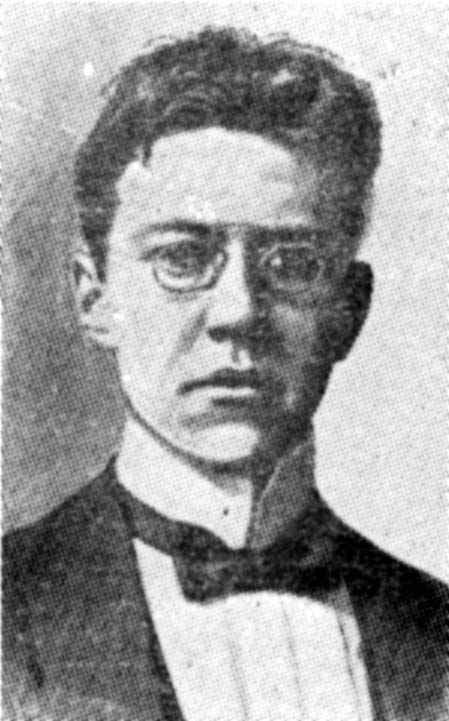
Rudolf Swiderski
Jerry Spinrad (Nashville, TN, USA) sends us the following from
the Washington Post, 12 August 1909:
‘Famous Chess Player a Suicide.
Special to The Washington Post.
Berlin, Aug. 11. – Swiderski, the celebrated chess player, was found dead today. Apparently he had poisoned and shot himself.’
Of course, such a lamentable affair cannot be left with an ‘apparently’, but there is in any case a major discrepancy which will, we hope, now prompt a reader in Germany to investigate what appeared in the local press: if Swiderski died on 12 August (as chess reference books affirm), how could the despatch from Berlin be dated 11 August?
The death-date 12 August was given on page 286 of the September 1909 Deutsche Schachzeitung, which reported that Swiderski had killed himself on account of his living circumstances and rather than undergo a necessary operation: ‘Am 12. August schied Swiderski aus eigener Entschliessung aus dem Leben. Unzufrieden mit seinen Lebesverhältnissen und von Krankheit heimgesucht, zog er den Tod einer notwendig gewordenen Operation vor.’
Deutsches Wochenschach (15 August 1909, pages 285-286) gave no exact date, merely stating that he had died suddenly in the past week. Deutsche Schachblätter (15 August 1909, page 56) accorded Swiderski’s death five lines, reporting that he had died suddenly in his 31st year. Nor was a date specified by L. Bachmann is his obituary of Swiderski on page 194 of Schachjahrbuch für 1909 (Ansbach, 1909). The Wiener Schachzeitung (October 1909, pages 351-352) printed an impossible date of death (2 September), whereas the American Chess Bulletin (October 1909, page 227) put 2 August.
Of the reports currently known to us, only the Washington Post indicated, speculatively, the cause of death (i.e. the unusual combination of poisoning and shooting). Moreover, it stated that on 11 August Swiderski was ‘found dead’, which does not necessarily mean that he died that day.
(3654)
Olimpiu G. Urcan (Singapore) sends a report on page 11 of the Trenton Evening Times of 11 August 1909:
‘Noted chess player ends life
Leipsig. Aug. 11. – The body of R. Swiderski, the noted chess player, who committed suicide on August 2, was found today in the room where he had poisoned himself and then fired a bullet into his head. The body was badly decomposed. The date of the suicide was determined by a note left by Swiderski. Swiderski was recently convicted of perjury in a trial that involved him in a disgraceful scandal.’
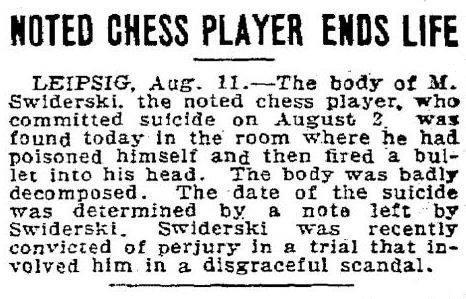
C.N. 3654 asked, unavailingly, if a reader in Germany could investigate what appeared in the local press, and there is now all the more reason to do so.
(4728)
Having followed up on a clue provided by Jon D’Souza-Eva (Oxford, England) about publication of news of Swiderski’s suicide in the Scottish press, we can quote a report on page 8 of The Scotsman, 12 August 1909:
‘Chess Champion’s Tragic End
Berlin, 11 AugustA telegram from Leipzig reports the suicide of Swiderski, the champion chess player of the world, under dramatic circumstances. The evidence points to Swiderski having taken his life on the 2d inst., but the body was only found today, being in a terrible state of decomposition. The unhappy man had apparently taken poison, and then shot himself with a revolver. Allegations of perjury in connection with a love affair had been made against the deceased, and it is supposed that fear of legal proceedings was the motive which led to the tragedy. – Central News.’
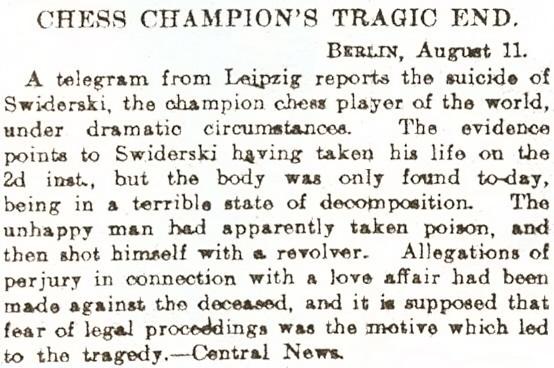
(6629)
Olimpiu G. Urcan (Singapore) adds this similar report from page 4 of the Western Times (London) of 12 August 1909:
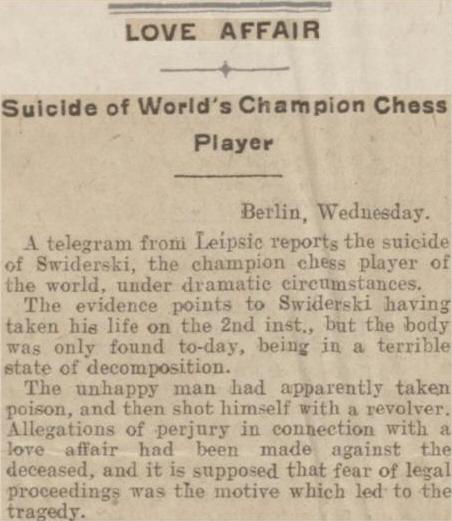
For a specimen of Swiderski’s signature see Chess Autographs.
Addition from John Townsend (Wokingham, England) on 25 July 2022:
‘W.E. Napier offered the following insight into Swiderski’s “abnormally sensitive nature”, which he considered was the cause of his “untimely end”. The chess column of the New Zealand Herald (5 February 1910, page 4 (Supplement)) quoted the passage from Napier’s column in the Pittsburg Despatch, but without giving its date:
“We met Swiderski and played chess with him in 1902, and our observation on the main leads us to suppose, in the light of subsequent events, that he was one of temperamental depressions and ecstacies – in a word, ups and downs. After losing a game he was accustomed to adjourn to the top floor of the building and there to fight it out with himself on a grand piano. He was a good musician. We assert, in spite of all prevailing notions to the contrary, that it was his abnormally sensitive nature which brought about his untimely end. Indeed, any man who, in the event of so paltry a loss as that of a game of chess, dissolves in tears to the accompaniment of a Beethoven sonata deserves to have his self-inflicted death ascribed not to chess, but rather to a hysterical organisation.”’
Addition on 29 January 2025:
From page 4 of the Brooklyn Daily Eagle, 13 August 1909:

To the Chess Notes main page.
To the Archives for other feature articles.
Copyright: Edward Winter. All rights reserved.